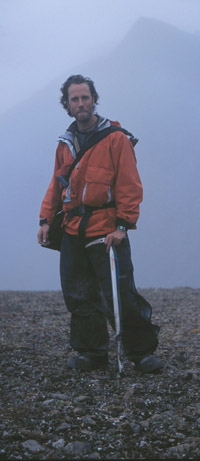
Canada Research Chair in Vertebrate Palaeontology
Macroevolution is the theme of my lab. Two main axes of research traverse this interdisciplinary field of science in the lab. Large scale patterns of evolution are be identified by looking at the evolution of details of skeletal anatomy and bone microstructure of vertebrate animals across time and ecosystem communities of plants and animals across time and geographic position. Most of the animal evolution work focuses on archosaurian reptiles (crocodiles, dinosaurs, birds, and relatives) during the Mesozoic Era (250 to 65 million years ago) although we also include fishes, amphibians, and relatively modern mammals for side projects. The evolution of ecosystem communities is limited to terrestrial plants and animals within the Mesozoic Era where we are attempting to describe how plants and animal communities are evolving at an ecosystem level using the current techniques of diversity and spatial ecology. Our contribution to the datasets is primarily through fieldwork in the Canadian High Arctic.
The second research theme in my lab examines the process of evolutionary transformations (as much as a process can be examined) through a research programme of Developmental Evolution. This effort uses skeletal evolutionary transformations across the fin to limb transition of fish and amphibians and non-flying to flying transition of dinosaurs to birds. After characterising the evolutionary transformation we test hypotheses of developmental changes that may explain the evolutionary transformations with embryological and molecular data. This work has steered some members of the lab to develop software to examine issues of developmental sequence evolution and modularity while leading others to explore fruitful developments of the theory of homology and modularity.
The research breadth of the lab is not by accident. My approach to research and teaching attempts a synthetic view that all my graduate students are involved with. Disparate research (e.g. fieldwork in the arctic, experimental embryology) on large-scale themes (macroevolution) are what I see as the best training ground and intellectual growth for me and my students.
Contact Information:
Redpath Museum
McGill University
859 Sherbrooke St. West
Montreal, Quebec
H3A 2K6
CANADA
Email: hans.ce.larsson![]() mcgill.ca
mcgill.ca
Redpath Museum room 205
Phone: (514) 398-4086 ext. 089457
Fax: (514) 398-3185